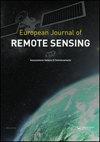卫星热成像作为识别冷空气池的重要工具:以西班牙东南部为例
IF 3.7
4区 地球科学
Q2 REMOTE SENSING
引用次数: 1
摘要
摘要夜间温度反演(NTIs)的形成过程在一年中具有重要意义,尤其是影响大气稳定夜间最低温度的地表分布。研究区域的地面气象站密度较低,促使人们使用热成像技术绘制和识别冷空气池CAP。稳定夜晚的热分布导致山谷地区和低洼地区以及地形复杂地区空气变暖地区形成CAP。AQUA和SUOMI-NPP(MODIS和VIIRS LST)的卫星产品进行的热成像是唯一能够对研究区域进行全面射线照相的工具,从而克服了最低表面温度插值的局限性。因此,该研究的主要目的是将热成像视为识别CAP的重要工具。使用的产品与气象观测站记录的表面温度(R2 0.87/0.88和Bias−1.2/-1.3)进行了统计验证,新的目标是绘制夜间稳定过程中的热分布图…本文章由计算机程序翻译,如有差异,请以英文原文为准。
Satellite thermographies as an essential tool for the identification of cold air pools: an example from SE Spain
ABSTRACT The processes involved in the formation of nocturnal temperature inversions (NTIs) are of great relevance throughout the year, notably influencing the surface distribution of minimum temperatures during nights of atmospheric stability. The low density of surface meteorological stations in the study area motivated the use of thermographies for the mapping and identification of cold air pools CAPs. Thermal distribution during stable nights leads to the formation of CAPs in valley areas and depressed areas, and in areas with warmer air (WAM) in orographically complex areas. The thermographies carried out with satellite products from AQUA and SUOMI-NPP (MODIS and VIIRS LST) represent the only tool capable of fully radiographing the territory under study, thus overcoming the limitations in the interpolation of minimum surface temperatures. The main objective of the research was, therefore, to value thermography as an important tool in the identification of CAPs. The products used were subjected to statistical validation with the surface temperatures recorded in meteorological observatories (R2 0.87/0.88 and Bias −1.2/-1.3) with a new objective of making thermal distribution maps in nocturnal stability processes …
求助全文
通过发布文献求助,成功后即可免费获取论文全文。
去求助
来源期刊

European Journal of Remote Sensing
REMOTE SENSING-
CiteScore
7.00
自引率
2.50%
发文量
51
审稿时长
>12 weeks
期刊介绍:
European Journal of Remote Sensing publishes research papers and review articles related to the use of remote sensing technologies. The Journal welcomes submissions on all applications related to the use of active or passive remote sensing to terrestrial, oceanic, and atmospheric environments. The most common thematic areas covered by the Journal include:
-land use/land cover
-geology, earth and geoscience
-agriculture and forestry
-geography and landscape
-ecology and environmental science
-support to land management
-hydrology and water resources
-atmosphere and meteorology
-oceanography
-new sensor systems, missions and software/algorithms
-pre processing/calibration
-classifications
-time series/change analysis
-data integration/merging/fusion
-image processing and analysis
-modelling
European Journal of Remote Sensing is a fully open access journal. This means all submitted articles will, if accepted, be available for anyone to read anywhere, at any time, immediately on publication. There are no charges for submission to this journal.
 求助内容:
求助内容: 应助结果提醒方式:
应助结果提醒方式:


